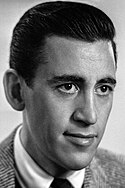J.D. Salinger Quote
I knew this one Catholic boy, Louis Shaney, when I was at the Whooton School. Then, after a while, right in the middle of the goddam conversation, he asked me, Did you happen to notice where the Catholic church is in town, by any chance? The thing was, you could tell by the way he asked me that he was trying to find out if I was a Catholic. He really was. Not that he was prejudiced or anything, but he just wanted to know. He was enjoying the conversation about tennis and all, but you could tell he would've enjoyed it more if I was a Catholic and all. That kind of stuff drives me crazy. I'm not saying it ruined our conversation or anything—it didn't—but it sure as hell didn't do it any good. That's why I was glad those two nuns didn't ask me if I was a Catholic. It wouldn't have spoiled the conversation if they had, but it would've been different, probably. I'm not saying I blame Catholics. I don't. I'd be the same way, probably, if I was a Catholic. It's just like those suitcases I was telling you about, in a way. All I'm saying is that it's no good for a nice conversation. That's all I'm saying.
I knew this one Catholic boy, Louis Shaney, when I was at the Whooton School. Then, after a while, right in the middle of the goddam conversation, he asked me, Did you happen to notice where the Catholic church is in town, by any chance? The thing was, you could tell by the way he asked me that he was trying to find out if I was a Catholic. He really was. Not that he was prejudiced or anything, but he just wanted to know. He was enjoying the conversation about tennis and all, but you could tell he would've enjoyed it more if I was a Catholic and all. That kind of stuff drives me crazy. I'm not saying it ruined our conversation or anything—it didn't—but it sure as hell didn't do it any good. That's why I was glad those two nuns didn't ask me if I was a Catholic. It wouldn't have spoiled the conversation if they had, but it would've been different, probably. I'm not saying I blame Catholics. I don't. I'd be the same way, probably, if I was a Catholic. It's just like those suitcases I was telling you about, in a way. All I'm saying is that it's no good for a nice conversation. That's all I'm saying.
Related Quotes
About J.D. Salinger
The Catcher in the Rye (1951) was an immediate popular success; Salinger's depiction of adolescent alienation and loss of innocence was influential, especially among adolescent readers. The novel was widely read and controversial, and its success led to public attention and scrutiny. Salinger became reclusive, publishing less frequently. He followed Catcher with a short story collection, Nine Stories (1953); Franny and Zooey (1961), a volume containing a novella and a short story; and a volume containing two novellas, Raise High the Roof Beam, Carpenters and Seymour: An Introduction (1963). Salinger's last published work, the novella Hapworth 16, 1924, appeared in The New Yorker on June 19, 1965.
Afterward, Salinger struggled with unwanted attention, including a legal battle in the 1980s with biographer Ian Hamilton and the release in the late 1990s of memoirs written by two people close to him: Joyce Maynard, an ex-lover; and his daughter, Margaret Salinger.
